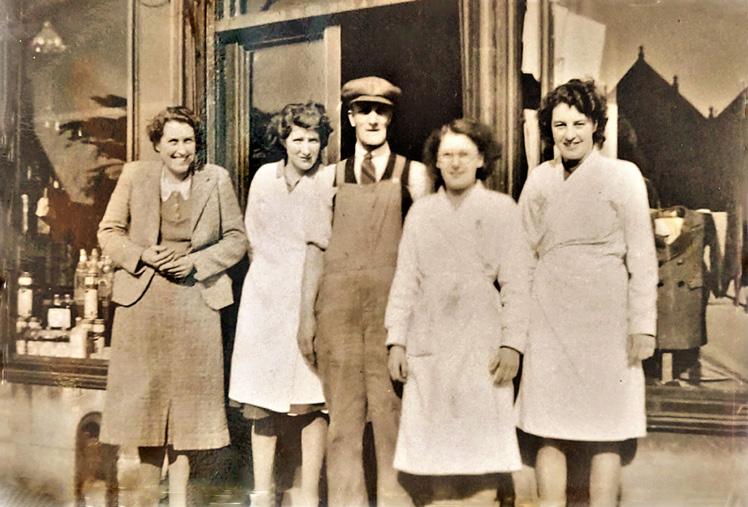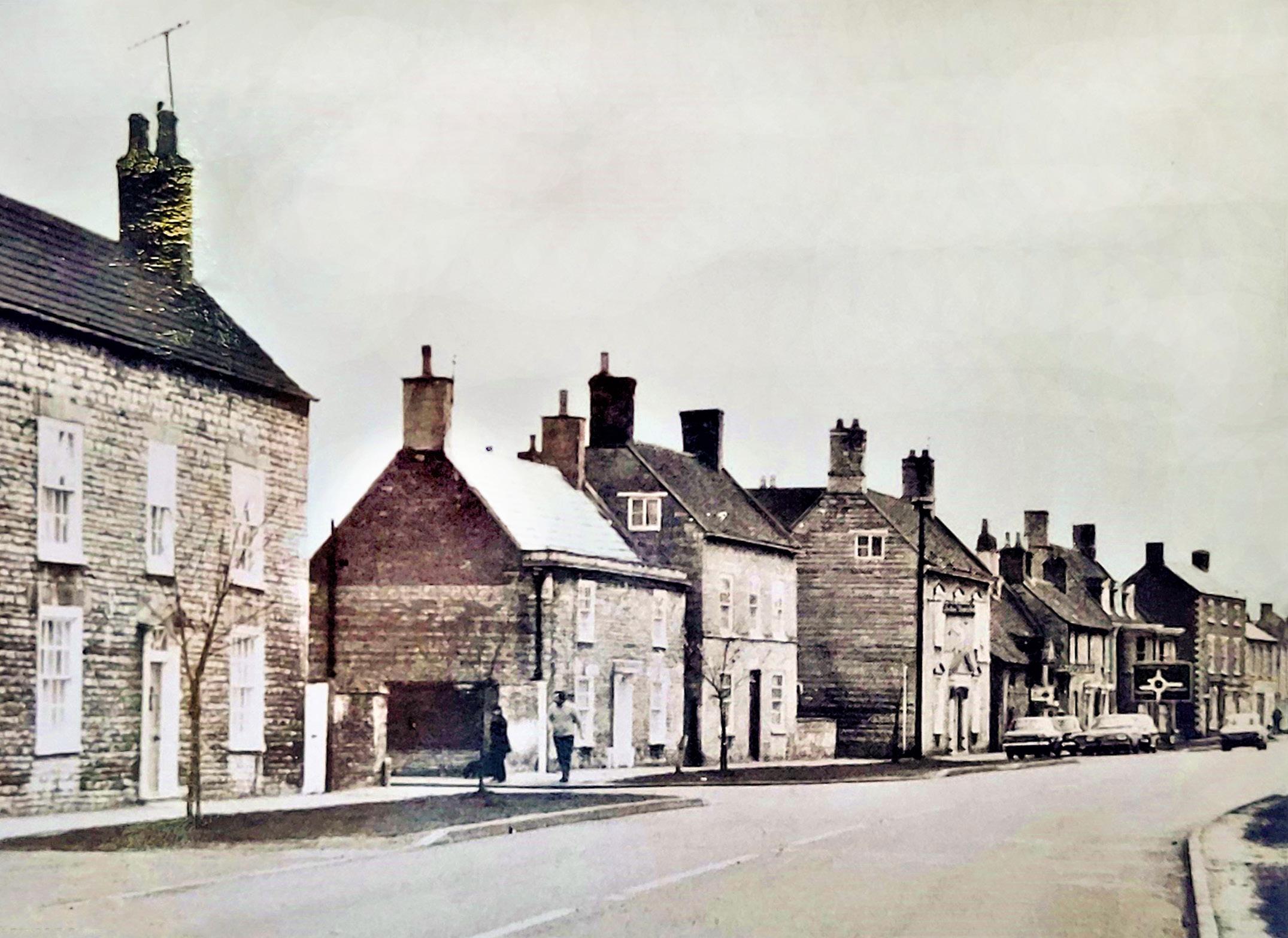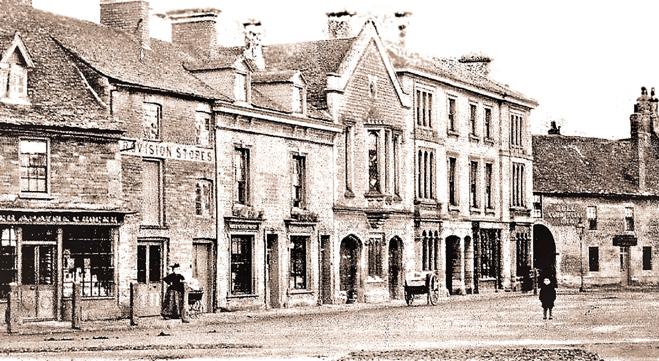
8 minute read
A Payne & Co
Candles are now lit for the atmosphere that they create and the scents that fill the home but when Queen Victoria was contemplating her wedding in 1840, candles were a necessity. It was a tradition for every loyal household in the land to burn a candle in their front room window on the evening of the monarch’s wedding and on 20th February of that year most people would have lit a Prices candle from a newly created mix of refined tallow and coconut oil. This was a great improvement for the vast majority of the population who could not afford beeswax used in the church and by the wealthy, as most people used tallow lights made from hoarded animal fat, with rush wicks.
It was Prices candles that Abraham Payne would peddle in the Deepings as an employee of John Osbourne of Daventry. It was here that he met his future wife, Mary Tomlin, daughter of Tobias, baker of 23 Bridge Street, Deeping St James. They married in 1857 when he was 26 and moved to Bourne where their son, Amos was born in 1859. They then moved to Church Street, Market Deeping, where their second son Richard Robinson was born in 1861, and Abraham set about building his own business as a candle maker, a chandler, in his own right. An ambitious man, he moved his family to larger premises in Chatteris and it was here that daughter Mary was born in 1863. The family grew along with the size of the business and there were six more children, with a nurse and domestic employed to help. Sadly son Amos died in Chatteris at the age of 17 and by 1891 the family had returned to the Market Place, Market Deeping, where they ran a draper’s and grocery business with son Henry (26) a grocer, having trained to be a draper in Staines in Middlesex. The emporium now sustained two assistants in the grocery, Jabez Grant and Harry Seekins, and a domestic, Sarah Chesterfield.
Advertisement
Meanwhile Richard moved to Glinton where he and his sister Mary also ran a grocery and draper’s employing Frank Wilderspin and James Beindge as grocers’ assistants. Sadly Richard died at the age of just 31 in 1892 and Frank took over the running of the business, keeping it in the Payne family with his marriage to Elizabeth Payne at St Guthlac’s Church in 1897.
Not all the family stayed in the Deepings. Alwin and Ebenezer emigrated to Australia and Abraham became a tailor’ cutter in Hornsey. But father Abraham continued to build the business, adding millinery to the services he offered, employing Anne Payne from Raunds as a milliner’s assistant with Grace Freeman from Horsegate as her apprentice. Arthur Browning from Northorpe was employed in the grocery. Ever looking to diversify, Abraham had been over enthusiastic and was summoned for the keeping of gunpowder in 1904, not having registered that he held stocks, as required by the 1883 Explosives Act.
The shop was getting bigger and busier and in 1905 moved to larger premises in Church Street, now occupied by the Opticians, Osteopaths and Red Cross Shop. Frank and Elizabeth took over the day-to-day running of the shop while their daughter Constance (11) was at school. Mary Harband from Yorkshire was employed as a milliner and Ethel Steed served as the domestic help. Abraham, living next door, kept a weather eye on the business; he employed Flora Green as a housekeeper and Marguerite Green as a milliner.

It was only natural that such an establishment would be targeted by criminals. One such was James Russell of Stratford who received three months hard labour at Bourne Sessions in 1910 for stealing a jacket and vest valued at ten shillings and sixpence which was hanging outside the shop. PC Darcy had seen the culprit and arrested him.
Abraham died in 1916 leaving a personal estate of £1,195 and his business and property worth £3,562. When Mary, an invalid, died in 1920, his children received equal shares in the business, with the proviso that if they sold the shares it was to be to another family member. Now the Wilderspins took over at the helm, the business going from strength to strength. Daughter Constance was married to William Appleton from Nottingham at St Guthlac’s in 1923, wearing an ivory coloured dress and carrying a horseshoe of orange blossom and heather. Her bouquet was made up lilies and white heather. Bridesmaids Kathleen Payne (cousin) and Molly Smith were in pale cinnamon with shoes and stockings to match, carrying shower bouquets of tea roses. Their pearl and gold initial bracelets were gifts of the bridegroom. Mr Teake from London was best man and a reception was held at the Church Street premises before the happy couple left for a honeymoon in Scotland, the bride in a navy blue frock coat dress. The bells of St Guthlac’s rang out to mark this auspicious occasion.

In 1925, Douglas Taylor, a machinist, and his accomplice Harry Haywood, a bricklayer’s labourer, both from Yorkshire, arrived in Deeping and proceeded to burgle two commercial premises. First was the Peterborough Co-operative Society
which yielded little of value and where they left behind nothing but a state of disorder. At Payne & Co they scaled a 12-foot wall, entering the property without disturbing the sleeping Wilderspins. Here they were more fortunate and took a quantity of silver, chiefly heirlooms and a number of wedding presents, after which they quaffed a bottle of port, leaving the empty bottle on the sink in the kitchen. They were apprehended and charged at Bourne Police Court before Councillor J.T. Holmes. Much of the property was recovered and returned to Mr Wilderspin.
Grace Freeman, whose parents ran a grocery shop in Horsegate became an increasingly important part of the enterprise, becoming the manageress of the drapery department in the 1920s. These were the days when this shop was the largest establishment in the Deepings; local centenarian Nancy Titman remembers: “In those days the shop seemed large and lofty, the drapery department was stocked with every kind of garment and all sewing requirements. Miss Freeman with her auburn hair was always immaculate, presiding over her department with authority, often terrifying young assistants who were never allowed to waste a second! She was an excellent saleswoman who knew her customers personally and her advice was usually taken.” When Miss Freeman went on one of her buying trips to London she bought with particular clients in mind, assuring her customers were always dressed in the best of taste and the latest fashion. Says Nancy, “It was fascinating to watch Miss Freeman handling the rolls of material on the polished counter with the brass rule let into the wood; she would deftly unfold the appropriate amount of cloth measuring it along the rule, making the required measurement before rapidly and expertly sliding open the scissors along to cut the fabric.” Grace Freeman died at Stamford Hospital in 1953 leaving a not inconsiderable estate of £1,214.

Mr and Mrs Wilderspin did not work in the shop but made sure that it was run efficiently by their employees. However, it was Mr Wilderspin himself who called on regular customers for their weekly order. Where other trades people used a horse and cart, Mr Wilderspin would use his own car and deliveries would be in a motor van. He would be welcomed to the front door by the housewife and after removing his hat and making the usual pleasantries he would sit at the table taking an order book from his Gladstone bag, removing the cap from his fountain pen and awaiting the list. When the customer paused, he would have a list of necessities and goods that he reeled off to remind her or prod her into further requirements.
The goods would arrive the next day delivered by Percy Tilley, the grocery warehouse manager. He was from West Deeping where he was born at the start of the century and had married Constance Rouse at Stamford Registry Office in 1924. He was never seen on deliveries without his cap. Conveniently the couple lived next door to the Wilderspins with their daughter Sylvia who was born in 1925.
By 1939 Elizabeth Wilderspin’s brother Henry moved in with the couple, working for the business as a commercial traveller. The family continued to employ a maid, and at this time it was Jessie Porter.
Abraham’s son, also Abraham, had built up his own tailor’s business in London, supplying six shops, while also becoming a major shareholder in Payne & Co in Market Deeping. When he married Catherine Brophy from Australia in Dalston in 1894, his sister, Elizabeth, had been a witness at the wedding. The couple had five children and employed several servants to help with their care. Following in his entrepreneurial father’s footsteps, Abraham became a Colonial Textile Merchant and was given the Freedom of the City of London. When he died aged 73 while visiting South Africa, Payne & Co was sold to Dudeney & Johnson, the Wilderspins moving to Nottinghamshire to be near to their daughter. Frank died in 1946 leaving a healthy £7,950 to his wife, who died in 1965 in Sussex.
Percy Tilley carried on working for the new owners. He died at home in Godsey Crescent where he had moved on his retirement leaving £3,171. Constance died relatively recently in 1995.









